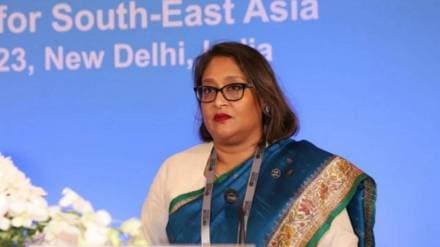The former prime minister of Bangladesh Sheikh Hasina and nine other people are the subject of an investigation by Bangladesh’s International Crimes Tribunal into allegations of genocide and crimes against humanity that occurred between July 15 and August 5, during the student uprising against her administration.
According to an article in The Dhaka Tribune, the complainant’s attorney, Gazi MH Tamim, stated on Thursday that the Tribunal had initiated the investigation. Tamim said the investigation agency started the investigation on Wednesday night.
A complaint was filed on Wednesday with the investigation agency of Bangladesh’s International Crimes Tribunal against Hasina, Awami League general secretary and former road transport and bridges minister Obaidul Quader, former home minister Asaduzzaman Khan Kamal, and several other prominent figures within the party.
The petition also names the Hasina-led Awami League and its allied entities.
Bulbul Kabir, the father of Class IX student Arif Ahmed Siam, who was slain during the anti-discrimination student movement, submitted the petition. In his application, Kabir charges Hasina and others with planning a bloody crackdown on student demonstrators that left many dead and violated people’s human rights.
The complaint was received on the same day that the interim administration announced the International Crimes Tribunal will try murder cases committed between July 1 and August 5.
In a related development, Hasina and five other people including former cabinet ministers were accused on Wednesday of kidnapping a lawyer in 2015 in connection with an enforced disappearance case.
Regarding the killing of a grocery store owner during the violent protests that resulted in the overthrow of Hasina’s government last month, a murder complaint was brought against her and six other people on Tuesday.
A Dhaka court, meantime, on Thursday ordered police to provide the investigative report for the case against Hasina and six other people over the July 19 quota protest killing of grocery store owner Abu Saeed from police firing in the Mohammadpur neighbourhood of the capital by September 15. The date for the next course of action was set by Dhaka Metropolitan Magistrate Md Zaki Al Farabi after the case was brought before his court.
Early in August, the student-led demonstrations calling for changes to government employment quotas turned into a movement to overthrow the government.
After the Hasina government fell on August 5, there were over 230 violent occurrences in Bangladesh, bringing the total number of deaths over the three weeks of turmoil to 560. After Hasina resigned, the nation was placed under caretaker rule by Nobel laureate Muhammad Yunus, who pledged to carry out political and administrative changes as well as bring those responsible for the violence accountable.
(with inputs from PTI)
